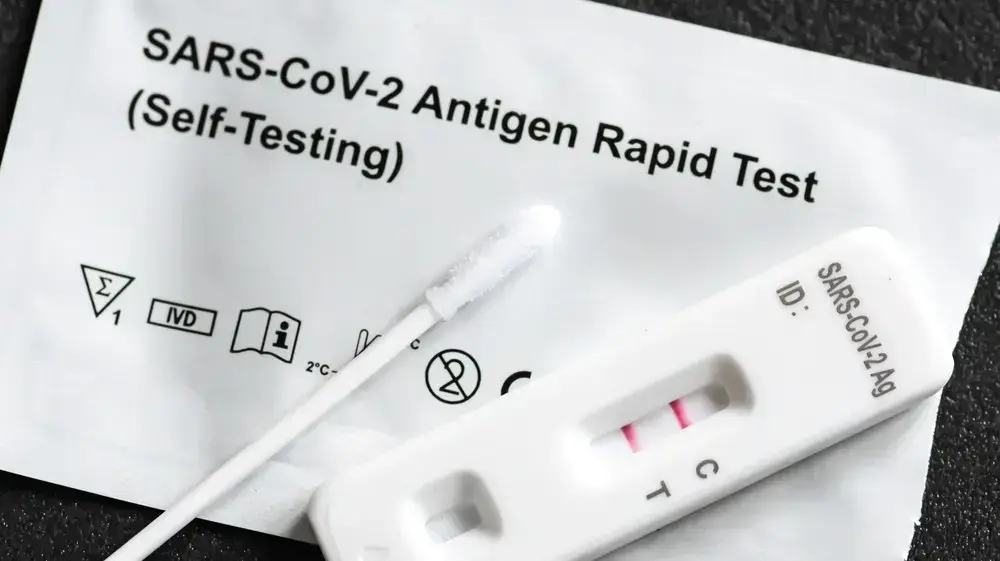The omicron variant of the coronavirus has the biggest number of mutations seen so far in its genome, and these changes appear to be manifesting themselves in the symptoms that those with infections are presenting.
While there is still scant data, early indications in Spain and other countries show that the new strain causes symptoms that are significantly different from those seen in other waves of the pandemic.
One of the clearest differences is the loss of the sense of smell.
In the first waves, this was suffered by up to 70% of patients, and was a very specific symptom of Covid compared to other respiratory infections.
Now this effect is very uncommon or nonexistent.
More information
First conclusions on omicron: Variant is growing exponentially and it is not clear if it is less severe
One of the paradigmatic examples can be found from one of the biggest omicron outbreaks studied so far. It took place on November 26 in a restaurant in Oslo, and involved a group of 111 people - all of whom were fully vaccinated and had taken antigen tests one or two days previously. One of them had just arrived from South Africa, where omicron was first identified. The variant infected up to 74% of the 110 people present. Of all of them, just 12% lost their sense of smell. The most common symptoms were coughs, runny noses and tiredness. None of those infected had to be hospitalized. The average age was 39.
Those same symptoms are mostly being detected in Spain during this new wave, in which omicron is gaining ground compared to the previously dominant strain, delta. Vicente Martín Sánchez, from the Spanish Society of Primary Healthcare and a professor of preventive medicine at the University of León, explains that most of those infected with this new strain have symptoms that are similar to a common cold or allergies. "The loss of smell is ever-more rare," he says. "In fact, it was already less common with the delta variant."
The doctor recommends that anyone with the aforementioned symptoms who thinks they may have Covid-19 should isolate and request a test as soon as possible.
“If people continue with their normal life thinking that they don't have Covid because they haven't lost their sense of smell, they will infect everyone in their environment,” he explains.
"It can't be flu because this virus is yet to appear this winter."
If people continue with their normal life thinking that they don't have Covid because they haven't lost their sense of smell, they will infect everyone in their environment
Vicente Martín Sánchez, from the Spanish Society of Primary Healthcare
At the Hospital Universitario Marqués de Valdecilla in Santander, the head of infectious diseases, Carmen Fariñas, is seeing the two sides of omicron ever more clearly. "We are seeing symptoms with sneezing,
rhinorrhea
[a runny nose], more moderate sore throats and fewer fevers than with other variants," the doctor explains. “It's very similar to a regular cold but perhaps with a bit more tiredness and discomfort. We are not now seeing the loss of taste and smell that was particularly characteristic of the alpha variant, ”she adds, in reference to the strain identified a year ago in England.
It is still too early, however, to consider this variant to be less severe, according to Fariñas. “It's true that we are seeing fewer hospital admissions, but right now the majority of the [Spanish] population is vaccinated and many have had a previous infection,” she explains. The impression is that omicron is not causing such serious symptoms, but when it does, the dangers of very serious complications or death are exactly the same. If the fact that this variant is more contagious is taken into account, there could be an explosion of hospitalizations simply due to the statistics. “In just a few days ICU admissions have tripled,” warns Fariñas.
At the Gregorio Marañón Hospital in Madrid, the "sensation" of Emilio Bouza, the head of infectious diseases, is that the "infection is milder and there are fewer admissions." He adds that “for now, this is just a feeling, given that there have been insufficient patients with omicron properly confirmed to collate enough data. Whatever the case, the loss of sense of smell was a very specific sign for Covid, but it was not substantial because many people got sick without losing it. "
“It's almost certain that the likelihood of serious illness due to omicron is lower than for other variants,” says Benito Almirante, the head of infectious diseases at the Vall d'Hebron Hospital in Barcelona. “We still don't have a lot of data, but here we have already seen more than 100 cases of omicron infections and not a single admission,” explains this spokesperson from the Spanish Society of Infectious Diseases and Clinical Microbiology. This is down to the fact that the majority of cases are among young people, the doctor adds.
“What is worrying is the possibility of infections among the more vulnerable, such as the over-60s and people with suppressed immune systems,” Almirante explains.
“Here in Catalonia, there is still a significant proportion of the population who are yet to get their third dose [of a Covid-19 vaccine].
We have to wait two or three weeks to see the effect that the Christmas holidays will have.
Whatever the case, I am convinced that we will not see hospitals overwhelmed as we did during the waves before there was a vaccine.
The data from the United Kingdom, where omicron is widespread, indicate that hospitalizations with this variant are five or 10 times lower than during the worst waves. "
It's almost certain that the likelihood of serious illness due to omicron is lower than for other variants
Benito Almirante, head of infectious diseases at the Vall d'Hebron Hospital
This change in symptoms could indicate that omicron is very contagious, but less efficient at causing serious illness, in Almirante's opinion.
There is data that support this possibility.
A preliminary study carried out at the University of Hong Kong using the new version of the virus and human cells has shown that this variant reproduces 70 times more than delta in bronchial tissue - ie the upper respiratory tract.
But this reproductive capacity is 10 times lower than delta in pulmonary tissue - the lungs are the organs in which the pneumonia that characterizes severe Covid-19 begins.
A second preliminary study carried out in the United Kingdom also points to omicron as being less efficient than delta when entering cells in the lungs. In this case, the team headed by Ravindra Gupta, a researcher from Cambridge University who is part of a group that advises the UK government on the threat posed by new and emerging respiratory viruses, created replicas of both variants based on the S protein in each of them. SARS-CoV-2 uses this protein to enter the cells and take over their molecular machinery to create millions of copies of itself.
The team reproduced all of the new mutations of omicron and saw that this S protein is less efficient at taking over mini-organs that simulate a person's lung tissue.
Another positive finding: the infected cells can connect with other healthy cells and infect them, but omicron is much worse at doing this than the original coronavirus or the delta variant.
5. In summary this work suggests that Omicron does appear to have become more immune evasive, but that properties associated with disease progression * may * be attenuated to some extent.
The significant growth of Omicron nevertheless represents a major public health challenge.
- Gupta Lab (@GuptaR_lab) December 17, 2021
The researchers also found that the two doses of the RNA vaccines - Pfizer-BioNTech and Moderna - do not stop omicron infections, but the protection is rapidly recovered with a third dose.
“In summary, this work suggests that Omicron does appear to have become more immune evasive, but that properties associated with disease progression * may * be attenuated to some extent.
The significant growth of omicron nevertheless represents a major public health challenge, ”he concluded.
Spanish version by Simon Hunter.

/cloudfront-eu-central-1.images.arcpublishing.com/prisa/5O5FPJZG7LDSSNEMMAXJC7CFNU.jpg)













